|
|
|
 |
|
|
|
God is a cruel and evil dude. Especially when he turns his back on you and doesn't love you anymore. The 17th Century was - according to the Churches - a time of human `Error.' The Earth was no longer the center of the Solar System, or, it seemed, of anything. Christian Europa was no longer the source of Civilization. Man was no longer the purpose of creation. Copernicus argued that the "Universe" had no center at all. America & China were busy moving history away from its Christian-Euro-Axis and suddenly no one could answer the question any more of what made the Monkey so Special? Descartes answered: his Mind. But he was "half-way René" and his agenda was to "conserve the old truths in the face of new threats." His dualism was actually an armistice between religion and science. He took the Mind/Soul from the physical world and gave it back to Religion. He gave the Body to Science. Minds and Souls he said lived forever but the Body was just mud. Mortal Mud. |
|
 |
Gottfried Leibniz came to see Spinoza in this house in the Hague in November of 1676. Legend says that they met in the Lens grinder's maison at least 3 times over the period of 4 days. Leib was on his way back to Germany after quitting Paris and then spending time in London - where he had been elected to the English Royal Society. Leib went first to Amsterdam where he spent a month with George Schuller, one of Spinoza's friends and disciples. By this time Leibniz was steeped in Spinoza, having read the Tractatus, and rumors were flying that Baruch was about to finish and publish his Grand Opus - The Ethics. The Rumors said that the book contained proofs that god did not exist and caused the Dutch philosopher to postpone the book's publication. Leibniz wanted to see those proofs because what he already knew and understood about Spinoza and his thought scared the German to death. There were thoughts which could not be allowed in that manuscript. Thoughts which threatened to change everything. Forever.
|
|
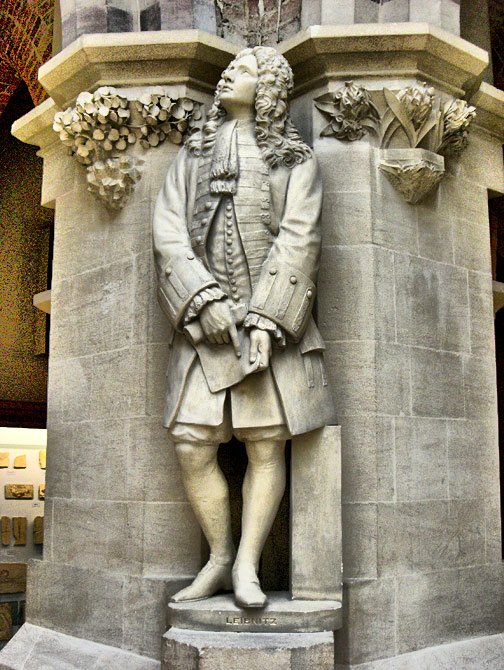 |
The Theologian Nicolas Malbranche saw the danger and issued his own version of god's realities: Every time a Mind interacts with or within the world, he claimed, god intervenes on that "occasion" and brings about his desired change for his Christian world. This idiocy was called: Occasionalism - and it offered up a Deus ex Machina solution where an outside "Agent" - or God - was now our "cover for ignorance." The NeoCons: Descartes, Malebranche, and Leibniz were now desperate to preserve "the theological and political order inherited from the Middle Ages" and to protect the Monkey's self-esteem in a world which was rapidly destroying that order and searching for a new sense of the monkey's worth. Spinoza, on the other hand, had simply made this problem go away by denying its Premise. The Mind, he said, was not outside Nature and its laws. "Man," he said, "is a part of Nature and must follow its laws and this alone is true worship." There was only One Substance and One Kingdom - the Kingdom of god in Nature. Deus sive Natura. Mind interacts in this Kingdom in 2 ways: as Mind and as Matter. Substance, Spin argued, has 2 Main Attributes from its Infinity of Attributes: Thought and Extension. Substance, under the attribute of Thought = Mind. Substance, under the attribute of Extension = Body. Spinoza dissolved the Paradoxes and Dualism of Cartesianism with one line: "The Order and Connection of ideas is the same as the Order and Connection of Things." Leibniz was horrified - and thrilled - "Spinoza thinks Mind is the very Idea of the Body," he realized - but wait! That meant that "Mind is the very Idea of the World." Plato was wrong! The Monkey's Mind does not grant him "an exemption from the order of nature." If Mind was Body and the body was mortal then the Mind was mortal too. Nothing lived after the death of the body. There was no immortal spirit or "soul" as it was understood by the Christian Fathers. And it followed from this that there was no such thing as Free Will, or even "Will" which was just a mode of thinking. Our "Freedom" was only this: "We are conscious of our desires but ignorant of the causes that determine them." Mind too was only an illusion since Thought is the Mind and does not happen "in" the mind. Worse, the "mind" was only partially "conscious" of itself and the Monkey was ruled by the Unconscious parts. |
|
|
The implications of Spinoza's model were devastating. Immortality was gone. When a Body ceased to exist, so did the Mind. Matthew Stewart comments: "If Spinoza is right, then philosophy since Plato is not just wrong, but an abomination, a fraud of global dimensions intended to excuse oppression in this world with the empty promise of justice in the afterlife." So what is left to make the Monkey special? Nothing. Except, for those like Spinoza & Skippy who choose to live a "life of the mind." Only this led to anything at all like the old idea of "Salvation." Bleak. Grey. When what used to Love you doesn't anymore where lies Happiness? When the Pope ruled the Universe and the Monkey's "Mind" then Happiness was a distant promise in a distant Paradise. But when the Protestants shattered that Unity then Happiness itself fell into pieces and there was a mad scramble to prop up the shards in the hands of the "individual's conscience." Happiness became Personal. But in the decentered new cosmos of man's insignificance how the fuck could you be happy? Spinoza had an answer. Happiness, he said, is the "realization of Self." Our Emotions, drives, desires needed to be understood by our Reason. Understanding our drives is the leash to controlling them and being "content" or "happy" with that progress. Emotions, Spinoza mapped out into 3 Attributes: Pleasure, Pain, and Conatus. The drive to "persist in one's being" and pursue our own interests and advantages he called: Conatus. Pleasure he defined as anything which swells Conatus, anything which increases a things power or its level of "perfection." Pain - that was easy - Pain is anything which reduces Conatus. Anything which drains its Power or Perfection. It is Virtue, Spinoza claimed, which brings peace to our raging Drives and Desires; it is Virtue which tames the Emotions into an Orderly State of control. Virtue comes about from our acceptance of those things beyond our control - what Nietzsche called: "Amor Fati" - the Love of Fate. Virtue is fed by our living lives of "enlightened self-interest." Or Self-Realization. Where the Church demanded Conformity to Authority, Spinoza asked for Reason as arbitor of Social Behavior. Do as you want, he said, as long as it doesn't harm the Others. |
|
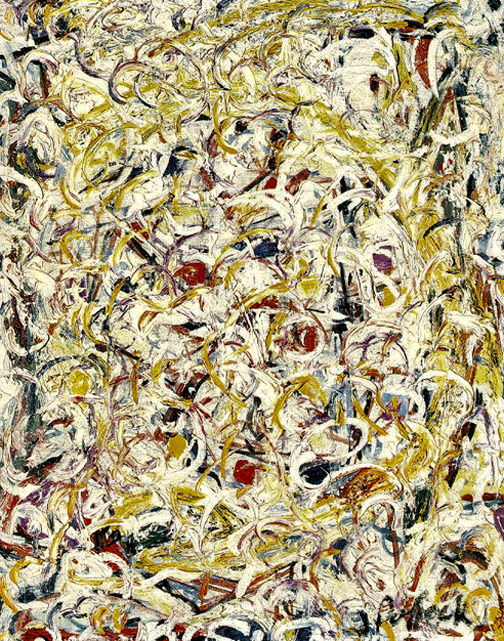 |
|
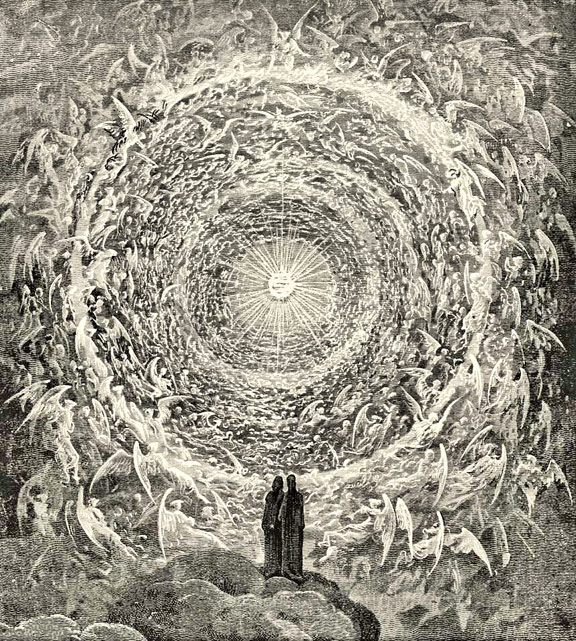 |
There are 3 kinds of Knowledge said Spinoza: The first and lowest is Sensory gnosis where we take in the world thru our senses promiscuously. The 2nd kind of Gnosis is Reflective Knowledge and results from our Analysis of Experience. It's us looking in the "mind's eye" at what our Senses have extracted from the world and making judgments & decisions. The 3rd and Highest kind of Knowledge he calls "Intuition" or "the Intellectual love of god." Knowing the world, or Nature, or god, in this 3rd way is the same as the Love of God. When the Monkey sees the world as it is and not as he is driven to see it then he is looking thru the No Gate Gate of Zen Buddhism. He has gone "Sub specie æternitatis" and is seeing the Universe "under the aspect of eternity" and groking what is Universally and Eternally True, without "reference to or dependence upon the merely temporal portions of reality." He has reached the "View from Nowhere" and has handed back his Vanishing Point so that he is without Perspective in a Universe of Infinite Perspectives on its own Unity. From this Chair the Matters of Monkeys are meaningless. How fucking Existential is this? And how calm and peaceful. The way to quiet the Will is to show it that what it wants doesn't matter. Thomas Nagel, in his book: The Absurd - wrote: "If sub specie æternitatis there is no reason to believe that anything matters, then that does not matter either, and we can approach our absurd lives with irony instead of heroism or despair." If only. But wait! Spinoza pulls nihilistic despair out by the root and casts it into the void: "Since the Individual is just a mode of God, the intellectual love of God is God's way of loving itself." So the improvement of our Minds and the swelling of our Conatus is all helping god to love itself more and since we are an attribute of god then we become Blessed in our love. |
|
|
|
|
|
|
|
|
|
|
|
|
|
|
|
|
|
There is no personal immortality in Spinoza's system - only some revised Platonic notion of the "union of the mind with ideas that are themselves timeless." It's a kind of escape from Time itself. This "Intuition" and gnosis is the end point of his philosophy. The "little jew" must have smiled - inwardly - when he drew the connections between the Blessedness of the Love of God with his own raft of names: Bento, Baruch, Benedictus - all of which mean "Blessed." Blessedness is the union - or Reunion - of the "I" with the Cosmos and there recognized as "Self." You can hear Jung jacking off. Spinozan Philosophy - preceding Nietzsche's - represents as "Transvaluation of Traditional Values." With Spinoza - you have to throw nearly everything away - you gotta get down and get Zen. Everything you believe is an Illusion. You are a Prisoner of your Senses, you Mind, and your Language. You are a slave to your "I"ist Perceptions. There is no god - in the Form which you have believed. There is no Individual Soul. No After Life. No Heaven. No Hell. And the god that survives this purging of beliefs is also a prisoner of his own laws. He can't change a thing. He can't hear your prayers and even if he could he has no way to answer them. There are no miracles, no chosen people, no saints, no devils, no angels, and no rules except the one: Swell your Conatus. Jesus doesn't love you anymore, Sailor. You should probably just eat your gun. And worse than all of these: there are no Spicy Mysteries. The Universe runs on Logic - and the High Octane kind called Logos - and everything in Time and Space is intricately connected and there are no gaps in Causality. The Universe is Perfect. And done. Finished. It's a dead block of ice and the only thing moving in it is your Mind. And its Monkey Illusions. Spinoza's philosophy is not a Religion "but it's clearly more than a Philosophy." Spinoza's god wins the cosmic bet of all Theologians: Create the Most Powerful God of All. The Omni-Omni. Muy Muy. Spinoza's God is so Powerful and Perfect that He does not have to Exist. He's a No-God God. He has created and sustains a Universe of Illusions which has no independent existence outside of a Monkey Mind's Perception and he does it without intervention or even his Presence. There is no Necessity for a "God" in a cosmos which is God. And everything else simply follows from Necessity. Leibniz needed to talk. |
|
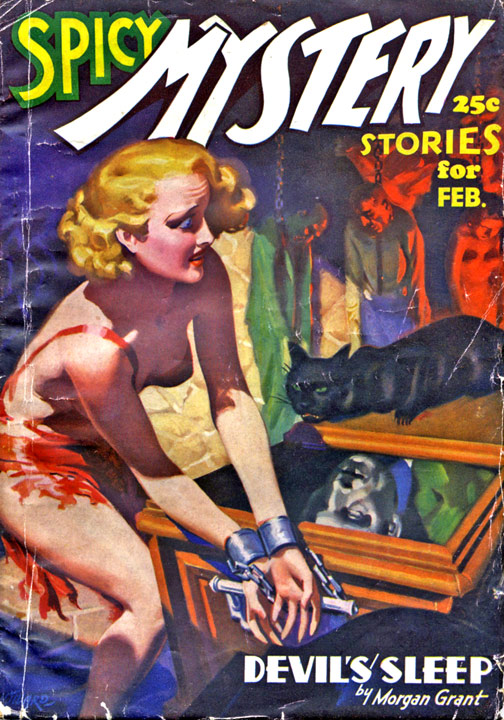 |
|
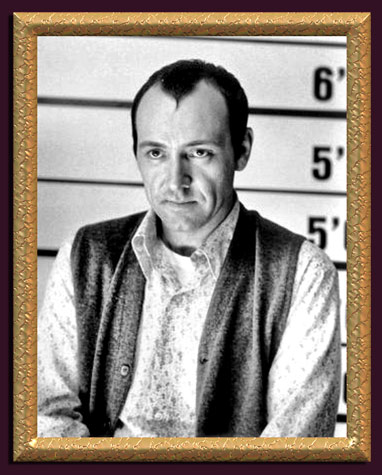 |
|
|
| In February of 1676 Gottfried Leibniz - the "last universal genius of Europe" - set out to write his Opus which would "cover it all." The Grand Fusion. He would call it: The Elements of a Secret Philosophy of the Whole of Things, Geometrically Demonstrated. Catchy fuckin' title. But he catches himself writing Spinozisms like: "The Reason for Things is the Aggregate of all the Requisites of Things." And: "The Reason for God is God." He freaks! He recoils at himself in horror. Spinoza's Tractatus and the rumors about his other Opus The Ethics have wormed their way into his Soul and now he was falling into doubt that his Soul even existed. So he brutally crushes any indications in his own thinking that he is going Spinozan. His task is to show that god is a Person, that he is an intelligent substance somehow free from his work. Above all, he must prove that God is an Actor on the Stage of Reality, that he is an Agent, a decision maker who faces real options and actively makes choices as he guides the independent little monkeys to their eternal salvation or their eternal punishments in Hell. He saw the Devil's fingerprints on Spinoza. He saw the pitfalls of trying to guide monkeys in a world where neither the devil nor god existed. The Devil, he decided, was trying to convince us that he didn't exist and to do that he was proving that god didn't exist. He had to talk to this man whose thinking was so intoxicating that he, himself, was drunk with it. In October he sailed for London where he was to join the Royal Academy chaired by his new friend Henry Oldenburg. The two men fell to discussing Spinoza - Oldenburg and Spinoza had formed a literary friendship - and Leibniz told Henry that he desperately needed to talk to Benedictus and show him his errors so that he could cauterize that heretical wound and free his mind from the nagging suspicions that Spinoza was right. Oldenburg wrote a letter of Introduction and gave it to Leibniz who would hand-deliver it to Spinoza in Holland. Then he would rip that "little jew" a new Asshole - philosophically speaking - and get some Mind-Peace at last. |
|
|
|
For a few weeks Leibniz travels the canals of Holland - it's a beautiful fall and that Triste is in the air. He is preparing a Proof for the Existence of God and he is writing this Proof as he travels towards Spinoza. He doesn't know it but Leibniz is setting himself up for the supreme test of Enlightenment. The One that the Zen Koan hints at when it says: When encountering the Buddha, kill the Buddha. He has become a Spinozist and he knows that for his successes in life to continue that he cannot be a Spinozist. Not yet, anyway. Hell, that won't happen for hundreds of years. Christians rule his world and they are bloody fanatics about their dogma. They still have the power to murder those who dissent with them. You can still smell the acrid pyre of Bruno. He had to find a hole in the "little jew's" logic or he was going to live the rest of his life as a lie. Because goddamn it all - Intuitively, he knew the little jew was right. Spinoza had thought the most important thought about god ever. And in doing it he freed his mind of god. He thought his way outside of god. No Pope, no Euro-King, could allow this to happen. Their powers were based on the fear of god, not his Blessedness in his Non-Existence. |
|
 |
|
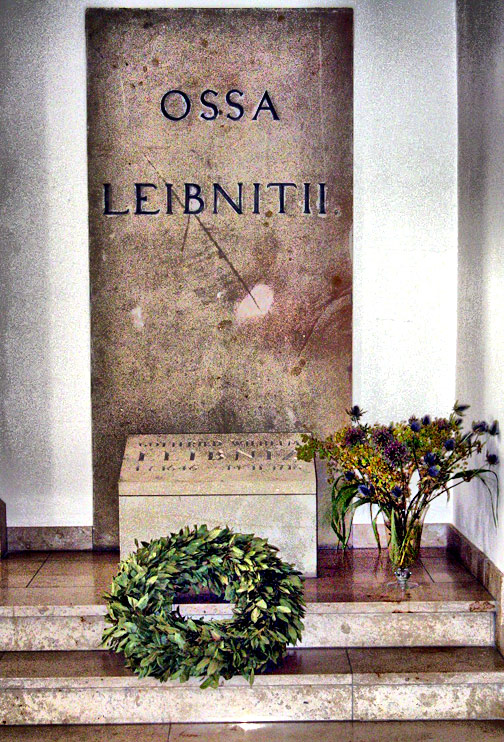 |
There were 3 meetings over 4 days from the 18th of November until the 21st. Spinoza is 43 and has only 3 months to live. He's got a cough and he uses many handkerchiefs. He's been making a middle-class living as a lens grinder for several years and the Etics get all engorged over their theories of Lung Damage from the fine and constant dust. Gottfried Leibniz is 30 years old and Europa's brightest rising star. He will live to be 70 years old and die in 1716. The only hard evidence of the visits were notes kept by Leibniz and they ask more questions than they answer. To prepare for the confrontation Leib had written a single sheet proof "That a Most Perfect Being Exists." With that "proof" he hoped to best the older Philosopher and put his own Spinozan demons to rest. Baruch Spinoza kept no notes and never wrote a word about the meeting. Each of them spoke many languages so they spoke in Latin. On the day of the last meeting - the 21st of November 1676 Gottfried Leibniz - with Spinoza's permission - brought along a guest. Joining them was another over-educated man living at the end of Theocracy; he was a tall man, broad shouldered and evenly muscled. He had thin greyish blond hair and Cornflower blue eyes. He was a Junker with a pedigree going back to the Teutonic Knights of the Baltic States, and if truth be told, even further. Leibniz introduced him as a Widerhaken von Vollendette and said that he dabbled in Theology. Barber Perfect will wax poetic for hours about this last meeting between the Dutch Philosopher, the German Polyglot, and the Prussian from the Baltic. He says it lasted from mid-morning until past dark and that when it was over he and Leibniz repaired to their Inn and got Jew-Stomping Drunk on Genever and a dark beer called Mother Superior. Barber says that Leibniz was lurching back and forth between Mania and Depression as he tried to assimilate his experiences with Spinoza. Barber says that finally Leibniz took a piece of paper, quill & ink and wrote this in large letters, after which he simply stared at them and sobbed: "If all Possibles were to Exist, there would be no need of a Reason for Existing, and Mere Possibility would be enough. So there would not be a god, except so far as he is possible." Barber knew immediately what it meant: it was the License for Atheism. Spinoza had shown Leibniz the most logical, reasonable, and powerful god which could ever be - there was no argument about that - this was truly a god with a jaw-dropping nature - there was no bigger god possible than the god which did not have to Exist. |
|
|
|
History records that Benedictus Spinoza died on 21 February 1677 and was buried in the Churchyard of the New Church in the Hague. But it also records that his body was stolen just before the burial and that the only thing buried in the casket that day was a copy of his Tractatus and some other papers. He had a grand funeral with 6 coaches and lines of mourners. Gottfried Leibniz went on to fame and then to ridicule. Voltaire made him into the Prime Fool. He died alone and unmourned and there is no record of anyone attending his funeral. The Bones of Leibniz lie in Hannover, Germany and no one has ever tried to steal them. The Bones of Spinoza are up for disputation still and as of yet have no final resting place. Though Kenny La Roche has a plan. |
|
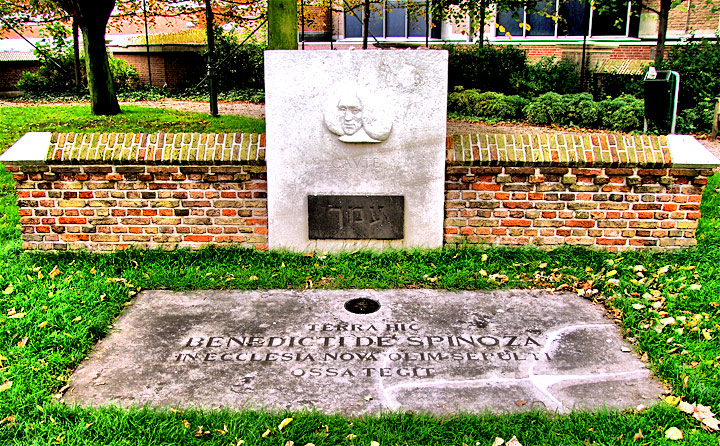 |
|
|
Use your Browser to go back. This is the end of the riff on Spinoza and the end of the Chosen Arrow Mission.
|
|
|
|
|
|
|
|
|
|
|
|
|
|
|
|
|
|









